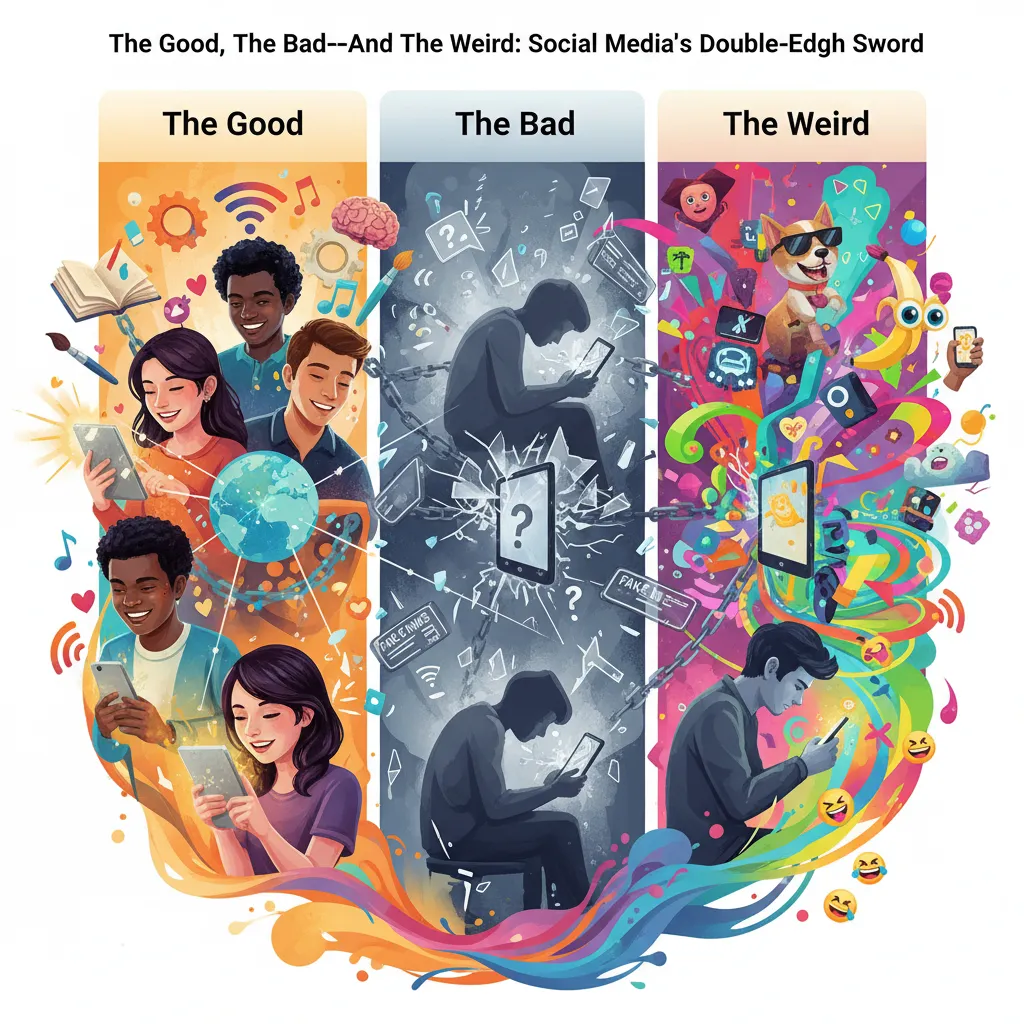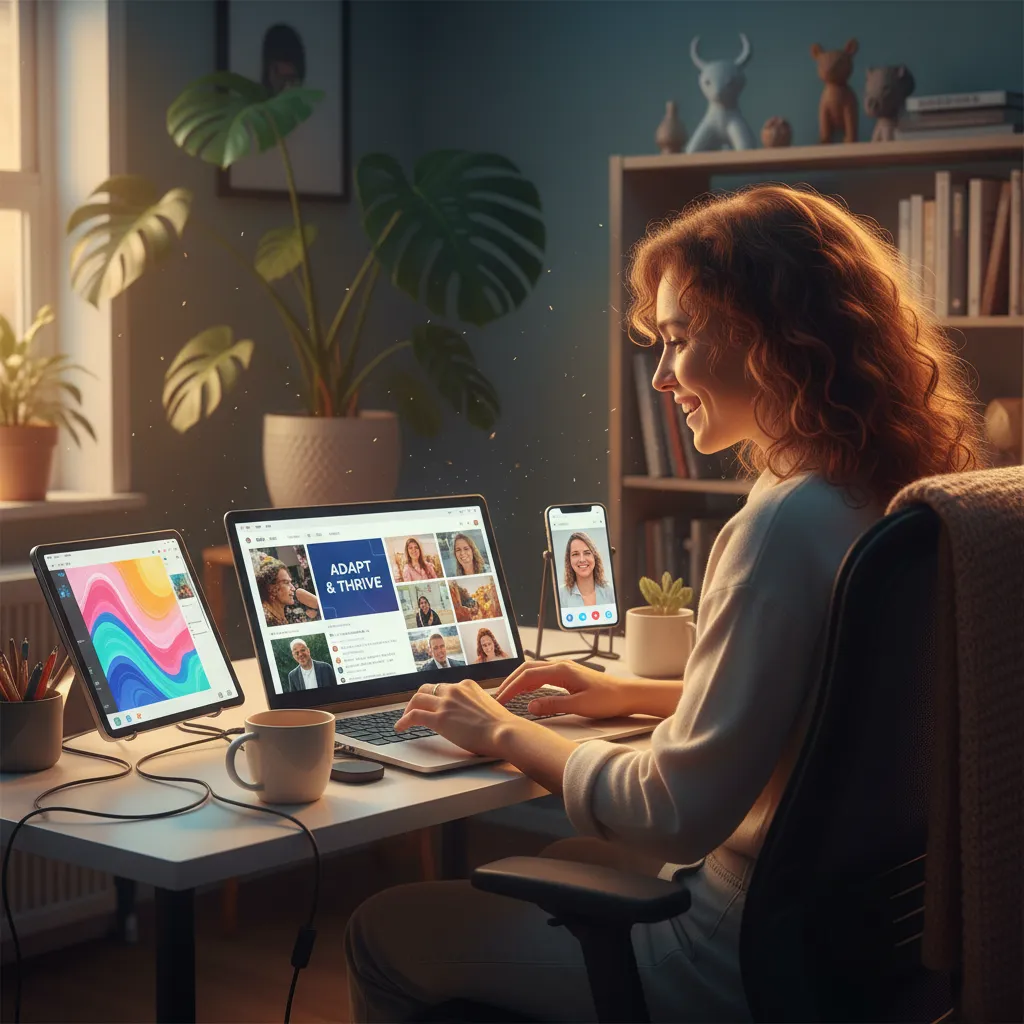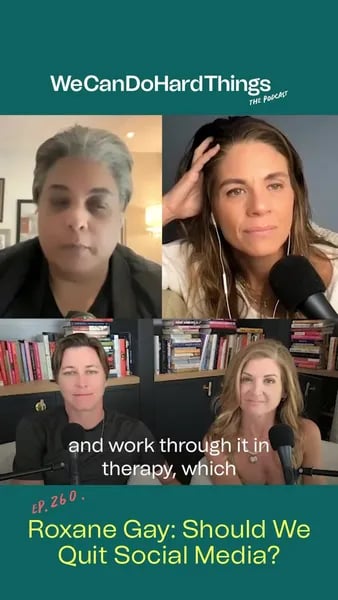Confession: I was scrolling Instagram in my pajamas when I landed on a clip of Roxane Gay asking, 'Why are you still on social media?' It hit me—why am I? Do any of us know, or are we all just following the dopamine cookie crumbs? In a world where our phones track our every move (and mood), it somehow feels rebellious to consider logging off or rethinking our feeds. But what if we didn’t? What if quitting isn’t the only answer? Let’s dissect this digital dilemma—and maybe reclaim a little joy from our screens along the way.
The Good, The Bad—And The Weird: Social Media’s Double-Edged Sword
Why are you still on social media? Does it make you happy, or does it leave you feeling anxious and overwhelmed? If you’ve ever asked yourself these questions, you’re not alone. Social media’s impact on happiness is a hot topic, with experts like Roxane Gay and Glennon Doyle exploring its emotional costs and benefits. The truth is, social media is a double-edged sword—offering both connection and creativity, but also anxiety and pressure. Let’s break down the good, the bad, and the just plain weird sides of social media in 2025.
Social Media: Community-Builder and FOMO Machine
One of the most positive effects of social media is its power to build communities. You can find support groups, creative inspiration, and instant access to information from anywhere in the world. Whether you’re learning a new skill on YouTube, joining a Facebook group for parents, or connecting with friends on Instagram, social media support and learning are real and meaningful. According to the World Happiness Report,
'Social media has both positive and negative effects on mental health, including fostering support and learning but also causing anxiety and sleep disruption.'
But there’s a flip side. The same feeds that connect us can also trigger FOMO (fear of missing out), relentless comparison, and social drama. Scrolling through highlight reels can make you feel like everyone else is living their best life—while you’re stuck on the sidelines. This emotional rollercoaster is a common experience, especially for teens and young adults.
Personal Anecdote: The Facebook Memory Effect
Let’s get personal for a moment. Have you ever had a Facebook memory pop up from years ago and felt a sudden rush of happiness? Maybe it was a photo from a perfect vacation or a funny moment with friends. I remember one morning when a memory notification made me smile for hours. But then, almost as quickly, I felt a little guilty for caring so much about a digital reminder. Why did it matter so much? This is the weirdness of social media happiness impact—it can lift your mood in an instant, but also leave you questioning why you’re so invested in the first place.
2025 Social Media Usage Trends: More People, More Pressure
Social media usage trends in 2025 show that more people are online than ever before. Global users now spend over 14 billion hours daily on social platforms. That’s a staggering number, and it’s still rising. But while usage is up, the emotional payoff is more complicated—especially for teens.
- In 2025, more teens report feeling overwhelmed by social media than in previous years.
- Teen perception of social media as a support system declined slightly from 2022 to 2024.
- Adults also report mixed feelings: joy, envy, burnout, and hope—all in the same day.
These trends highlight the complex social media impact on happiness and mental health. The platforms are designed to keep you engaged, but that engagement can come at a cost.
Support and Learning vs. Pressure and Anxiety: Two Sides, Same Feed
Every time you log in, you’re exposed to both the best and worst of social media. On one side, you have:
- Support: Online communities, mental health resources, peer encouragement.
- Learning: Access to information, creative inspiration, new skills.
On the other side, you face:
- Anxiety: Pressure to keep up, fear of missing out, social comparison.
- Sleep Disruption: Late-night scrolling, blue light exposure, disrupted routines.
Studies show that this mix of positive and negative effects is emotionally exhausting. It’s common to feel joy one moment and anxiety the next—sometimes from the same post.
Key Takeaways: The Emotional Rollercoaster
- Social media fosters connection, creativity, and learning—but can also increase anxiety and social drama.
- Usage is at an all-time high, but happiness outcomes are more complex than ever.
- Teens, in particular, are feeling the pressure, with support perceptions dropping and overwhelm rising.
- Your own experience may swing between happiness, guilt, envy, and hope—all thanks to the same feed.
Social media’s double-edged sword is real. The challenge is learning how to balance the good with the bad—and to recognize when the weirdness is getting to you.

If You Can’t Quit, Flip the Script: Finding Joy (Or At Least Relief) Online
Let’s be honest: quitting social media altogether isn’t realistic for everyone. Maybe you need it for work, to stay in touch with family, or just to keep up with the world. But if you’re still online and wondering if it’s making you happy or unhappy, you’re not alone. The real question isn’t just “Should I quit?”—it’s “How can I make social media work for me?” New research and creative personal experiments show that you can actually find positive effects of social media, boost your wellbeing, and even spark creativity—if you flip the script on how you use these platforms.
Curate Your Feed, Curate Your Mood
One of the most powerful ways to improve your digital wellbeing is by taking control of your feed. Research shows that personalizing and curating your digital environment is linked to more positive wellbeing outcomes. That means you don’t have to accept every post, ad, or drama magnet that pops up. Instead, you can:
- Mute or unfollow accounts that consistently bring negativity or stress.
- Follow accounts that inspire, educate, or make you laugh.
- Use features like “See First” or “Favorites” to prioritize uplifting content.
Think of your feed as your digital living room. Would you invite people who only complain or argue into your home every day? Probably not. The same goes for your online space. Curating your feed by removing negativity is associated with improved mood and digital wellbeing. It’s not about escaping reality—it’s about choosing what you want to focus on.
Unexpected Benefits: Smartphone Ownership and Wellbeing
There’s a common belief that smartphones and social media are pure harm, especially for kids. But new data is challenging that assumption. A 2025 USF study found that “Smartphone ownership among children is associated with positive outcomes, challenging assumptions about harm.” The exact percentages vary by region, but the trend is clear: when used thoughtfully, smartphones can help kids build connections, access information, and even improve their self-esteem.
So, what are the positive effects of social media and smartphone ownership benefits? For one, kids and adults alike can find supportive communities, learn new skills, and express themselves creatively. The key is not just having access, but knowing how to use these tools in ways that support your wellbeing.
Personal Experiment: A Week of Only Dog Accounts
Here’s a simple experiment you can try: for one week, unfollow or mute everything except accounts that post about dogs (or any topic that brings you joy). The results can be surprisingly profound. Instead of doomscrolling through arguments and bad news, you’ll find yourself smiling at goofy puppy videos and heartwarming rescue stories. This isn’t just about escapism—it’s about intentionally choosing content that lifts your mood and gives you relief from daily stress.
After a week, you might notice:
- Less anxiety and frustration
- More laughter and lightness
- A renewed sense of what you want from your online experience
This kind of digital experiment shows how curating your feed can directly impact your mood and overall digital wellbeing.
Social Media Connections and Creativity
Social media isn’t just a place for scrolling—it can be a powerful tool for connection and creativity. When you engage with creative and supportive communities, you boost your self-expression and reduce loneliness. Whether it’s sharing art, joining a book club, or participating in online challenges, these positive effects of social media can make a real difference in your daily life.
For example, joining a group for writers or artists can give you feedback, encouragement, and new ideas. Participating in hashtag challenges can spark your creativity and help you connect with others who share your interests. In the right environment, social media connections creativity and learning go hand in hand, supporting your wellbeing instead of draining it.
Flip the Script, Find Relief
The debate isn’t just about quitting social media, but about using it intentionally. By muting drama, curating your feed, and seeking out creative, supportive spaces, you can find joy—or at least relief—online. The next time you pick up your phone, remember: you have the power to shape your digital world.
 Podcast Reality Check: What Roxane Gay and Glennon Doyle Want You To Ask Yourself" />
Podcast Reality Check: What Roxane Gay and Glennon Doyle Want You To Ask Yourself" />Podcast Reality Check: What Roxane Gay and Glennon Doyle Want You To Ask Yourself
When it comes to understanding the true impact of social media on our happiness, few conversations are as honest and challenging as the one between Roxane Gay and Glennon Doyle. In their widely discussed episode, Should We Quit Social Media? (listen to episode #260 wherever you get your podcasts), these two influential voices invite you to pause and ask yourself: Why are you still on social media? Is it making you happy, or is it quietly draining your wellbeing?
This isn’t just another call to unplug. Instead, Gay and Doyle’s social media discussion centers on the power of self-reflection as a digital wellness tool. Before you think about deleting your accounts or setting strict boundaries, they urge you to get curious about your own experience. As Roxane Gay puts it,
“Listen to the questions, not just the answers—that’s where you find out what actually helps you online.”It’s a gentle but firm reminder that honest self-inquiry can be as potent as any digital detox when it comes to improving your online happiness and wellbeing.
Big Questions: Am I Happy or Unhappy Here?
One of the most powerful takeaways from the Roxane Gay social media discussion is the importance of asking yourself the big, sometimes uncomfortable questions. Are you genuinely happy when you scroll through your feeds, or do you leave feeling anxious, inadequate, or overwhelmed? Glennon Doyle’s social media insights highlight that many of us never pause to check in with ourselves—we just keep scrolling out of habit, fear of missing out, or even boredom.
Research is catching up to these personal reflections. The World Happiness Report is set to include a major study on social media and wellbeing in 2026, aiming to answer whether our digital lives are lifting us up or pulling us down. But you don’t have to wait for the data to start your own investigation. Honest self-reflection—asking “Am I happy or unhappy here?”—is a tool you can use right now to improve your relationship with social media.
Novel Ideas: Quitting Isn’t Always the Solution
It’s tempting to think that quitting social media is the only way to reclaim your happiness. But as Gay and Doyle point out in their social media quitting podcast, the answer isn’t always so black and white. Sometimes, changing how you use social media—curating your feed, setting time limits, or unfollowing accounts that make you feel bad—can be just as effective as quitting altogether. The key is to be intentional and mindful about your habits, rather than letting the platforms dictate how you spend your time and attention.
What If Everyone Took a Month Offline?
Imagine a world where everyone took a month off social media. Gay and Doyle play with this hypothetical, wondering what kind of wild revolutions or quiet revelations might unfold. Would we rediscover old hobbies, deepen our real-life relationships, or simply feel less anxious? While it’s impossible to predict exactly what would happen, the thought experiment highlights just how much of our happiness is tied to our digital routines—and how much potential there is for change if we step back, even briefly.
Critical Listening: The Comfort of Hard Truths
Listening to hard truths about social media can be oddly comforting. There’s relief in knowing you’re not alone in your struggles, and that even public figures like Roxane Gay and Glennon Doyle wrestle with the same questions. Their conversation encourages you to be kinder to yourself, to recognize that it’s normal to feel conflicted, and to remember that you have the power to shape your own digital boundaries.
As long-term research continues and the world waits for more definitive answers about social media and wellbeing, the most important thing you can do is keep asking yourself the tough questions. Your happiness is worth the effort. And as Gay reminds us, sometimes the questions themselves are more valuable than any answer a platform—or even a podcast—can provide.




